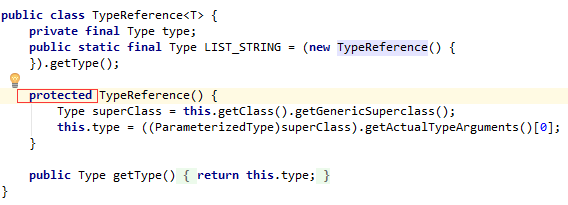https://www.cnblogs.com/cdf-opensource-007/p/7106018.html
{ "studentName": "lily", "studentAge": 12 }
[ { "studentName": "lily", "studentAge": 12 }, { "studentName": "lucy", "studentAge": 15 }
]
{ "teacherName": "crystall", "teacherAge": 27, "course": { "courseName": "english", "code": 1270 }, "students": [{ "studentName": "lily", "studentAge": 12 }, { "studentName": "lucy", "studentAge": 15 }] }
fastJson对于json格式字符串的解析主要用到了一下三个类:
JSON:fastJson的解析器,用于JSON格式字符串与JSON对象及javaBean之间的转换。
JSONObject:fastJson提供的json对象。
JSONArray:fastJson提供json数组对象。
我们可以把JSONObject当成一个Map<String,Object>来看,只是JSONObject提供了更为丰富便捷的方法,方便我们对于对象属性的操作。我们看一下源码。

同样我们可以把JSONArray当做一个List<Object>,可以把JSONArray看成JSONObject对象的一个集合。

此外,由于JSONObject和JSONArray继承了JSON,所以说也可以直接使用两者对JSON格式字符串与JSON对象及javaBean之间做转换,不过为了避免混淆我们还是使用JSON。
首先定义三个json格式的字符串,作为我们的数据源。
//json字符串-简单对象型
private static final String JSON_OBJ_STR = "{"studentName":"lily","studentAge":12}";
//json字符串-数组类型
private static final String JSON_ARRAY_STR = "[{"studentName":"lily","studentAge":12},{"studentName":"lucy","studentAge":15}]";
//复杂格式json字符串
private static final String COMPLEX_JSON_STR = "{"teacherName":"crystall","teacherAge":27,"course":{"courseName":"english","code":1270},"students":[{"studentName":"lily","studentAge":12},{"studentName":"lucy","studentAge":15}]}";
示例1:JSON格式字符串与JSON对象之间的转换。
示例1.1-json字符串-简单对象型与JSONObject之间的转换
/**
* json字符串-简单对象型与JSONObject之间的转换
*/
public static void testJSONStrToJSONObject(){
JSONObject jsonObject = JSON.parseObject(JSON_OBJ_STR);
//JSONObject jsonObject1 = JSONObject.parseObject(JSON_OBJ_STR); //因为JSONObject继承了JSON,所以这样也是可以的
System.out.println(jsonObject.getString("studentName")+":"+jsonObject.getInteger("studentAge"));
}
示例1.2-json字符串-数组类型与JSONArray之间的转换
/**
* json字符串-数组类型与JSONArray之间的转换
*/
public static void testJSONStrToJSONArray(){
JSONArray jsonArray = JSON.parseArray(JSON_ARRAY_STR);
//JSONArray jsonArray1 = JSONArray.parseArray(JSON_ARRAY_STR);//因为JSONArray继承了JSON,所以这样也是可以的
//遍历方式1
int size = jsonArray.size();
for (int i = 0; i < size; i++){
JSONObject jsonObject = jsonArray.getJSONObject(i);
System.out.println(jsonObject.getString("studentName")+":"+jsonObject.getInteger("studentAge"));
}
//遍历方式2
for (Object obj : jsonArray) {
JSONObject jsonObject = (JSONObject) obj;
System.out.println(jsonObject.getString("studentName")+":"+jsonObject.getInteger("studentAge"));
}
}
示例1.3-复杂json格式字符串与JSONObject之间的转换
/**
* 复杂json格式字符串与JSONObject之间的转换
*/
public static void testComplexJSONStrToJSONObject(){
JSONObject jsonObject = JSON.parseObject(COMPLEX_JSON_STR);
//JSONObject jsonObject1 = JSONObject.parseObject(COMPLEX_JSON_STR);//因为JSONObject继承了JSON,所以这样也是可以的
String teacherName = jsonObject.getString("teacherName");
Integer teacherAge = jsonObject.getInteger("teacherAge");
JSONObject course = jsonObject.getJSONObject("course");
JSONArray students = jsonObject.getJSONArray("students");
}
示例2:JSON格式字符串与javaBean之间的转换。
首先,我们针对数据源所示的字符串,提供三个javaBean。
public class Student {
private String studentName;
private Integer studentAge;
public String getStudentName() {
return studentName;
}
public void setStudentName(String studentName) {
this.studentName = studentName;
}
public Integer getStudentAge() {
return studentAge;
}
public void setStudentAge(Integer studentAge) {
this.studentAge = studentAge;
}
}
public class Course {
private String courseName;
private Integer code;
public String getCourseName() {
return courseName;
}
public void setCourseName(String courseName) {
this.courseName = courseName;
}
public Integer getCode() {
return code;
}
public void setCode(Integer code) {
this.code = code;
}
}
public class Teacher {
private String teacherName;
private Integer teacherAge;
private Course course;
private List<Student> students;
public String getTeacherName() {
return teacherName;
}
public void setTeacherName(String teacherName) {
this.teacherName = teacherName;
}
public Integer getTeacherAge() {
return teacherAge;
}
public void setTeacherAge(Integer teacherAge) {
this.teacherAge = teacherAge;
}
public Course getCourse() {
return course;
}
public void setCourse(Course course) {
this.course = course;
}
public List<Student> getStudents() {
return students;
}
public void setStudents(List<Student> students) {
this.students = students;
}
}
json字符串与javaBean之间的转换推荐使用 TypeReference<T> 这个类,使用泛型可以更加清晰,当然也有其它的转换方式,这里就不做探讨了。
示例2.1-json字符串-简单对象型与javaBean之间的转换
/**
* json字符串-简单对象与JavaBean_obj之间的转换
*/
public static void testJSONStrToJavaBeanObj(){
Student student = JSON.parseObject(JSON_OBJ_STR, new TypeReference<Student>() {});
//Student student1 = JSONObject.parseObject(JSON_OBJ_STR, new TypeReference<Student>() {});//因为JSONObject继承了JSON,所以这样也是可以的
System.out.println(student.getStudentName()+":"+student.getStudentAge());
}
示例2.2-json字符串-数组类型与javaBean之间的转换
/**
* json字符串-数组类型与JavaBean_List之间的转换
*/
public static void testJSONStrToJavaBeanList(){
ArrayList<Student> students = JSON.parseObject(JSON_ARRAY_STR, new TypeReference<ArrayList<Student>>() {});
//ArrayList<Student> students1 = JSONArray.parseObject(JSON_ARRAY_STR, new TypeReference<ArrayList<Student>>() {});//因为JSONArray继承了JSON,所以这样也是可以的
for (Student student : students) {
System.out.println(student.getStudentName()+":"+student.getStudentAge());
}
}
示例2.3-复杂json格式字符串与与javaBean之间的转换
/**
* 复杂json格式字符串与JavaBean_obj之间的转换
*/
public static void testComplexJSONStrToJavaBean(){
Teacher teacher = JSON.parseObject(COMPLEX_JSON_STR, new TypeReference<Teacher>() {});
//Teacher teacher1 = JSON.parseObject(COMPLEX_JSON_STR, new TypeReference<Teacher>() {});//因为JSONObject继承了JSON,所以这样也是可以的
String teacherName = teacher.getTeacherName();
Integer teacherAge = teacher.getTeacherAge();
Course course = teacher.getCourse();
List<Student> students = teacher.getStudents();
}
对于TypeReference<T>,由于其构造方法使用 protected 进行修饰,所以在其他包下创建其对象的时候,要用其实现类的子类:new TypeReference<Teacher>() {}

此外的:
1,对于JSON对象与JSON格式字符串的转换可以直接用 toJSONString()这个方法。
2,javaBean与JSON格式字符串之间的转换要用到:JSON.toJSONString(obj);
3,javaBean与json对象间的转换使用:JSON.toJSON(obj),然后使用强制类型转换,JSONObject或者JSONArray。